Pedagogy
> Peteatho
> Research
Strategies and Tips for Successful Online Teaching. Skip to main content You are here Strategies and Tips for Successful Online Teaching In this six-part series, SAGE author and education expert Dr.
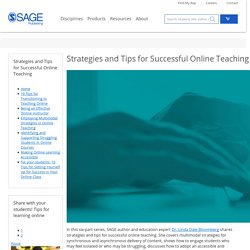
Linda Dale Bloomberg shares strategies and tips for successful online teaching. She covers multimodal strategies for synchronous and asynchronous delivery of content, shows how to engage students who may feel isolated or who may be struggling, discusses how to adopt an accessible and equitable instructional approach, and offers a handout that instructors can give to students on the first day of class with tips for student success in the online environment. Part 1: 10 Tips for Transitioning to Teaching Online All students are capable of succeeding in online courses, but the way courses are designed and taught matters. Part 2: Being an Effective Online Instructor Part 3: Employing Multimodal Strategies in Online Teaching. Watson and McIntyre 2020 Rapid Evidence Review Television. Online Learning: A Panacea in the Time of COVID-19 Crisis - Shivangi Dhawan, 2020.
The deadly and infectious disease Corona Virus also known as Covid-19 has deeply affected the global economy.
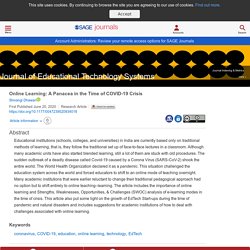
This tragedy has also shaken up the education sector, and this fear is likely to resonate across the education sector globally. The Covid-19 pandemic outbreak forced many schools and colleges to remain closed temporarily. Several areas are affected worldwide and there is a fear of losing this whole ongoing semester or even more in the coming future. Various schools, colleges, and universities have discontinued in-person teaching. As per the assessment of the researchers, it is uncertain to get back to normal teaching anytime soon. Several arguments are associated with e-learning. The severe explosion of Corona Virus disease can make us add one more argument in terms of online learning, that is, online learning serves as a panacea in the time of crisis.
Literature Review. Full article: Feedback loops and the longer-term: towards feedback spirals. Introduction The importance of useful feedback for advancing student learning is well-established (e.g.
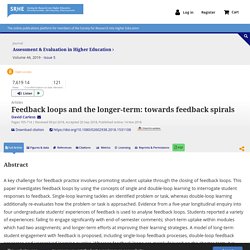
Hattie and Timperley 2007Hattie, J., and H. Timperley. 2007. “The Power of Feedback.” Review of Educational Research 77 (1):81–112.
SAGE Reference - Reshaping Rhetorical Space: E-learning through Online Asynchronous Discussion. The seven principles of online learning: Feedback from faculty and alumni on its importance for teaching and learning. Agar, M. (1996) Speaking of Ethnography, 2nd edn, Sage, Thousand Oaks, CA.
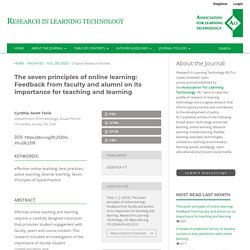
Bali, M. (2014) ‘MOOC Pedagogy: gleaning good practice from existing MOOC’s’, Journal of Online Learning and Teaching, vol. 10, no 4, pp. 44–56. Bacchus, R., et al. (2019) ‘When rubrics aren’t enough: exploring exemplars and student rubric co-construction’, Journal of Curriculum and Pedagogy, pp. 1–14. doi: 10.1080/15505170.2019.1627617. Modelling in the classroom. Pdf session 5 rosenshine stages of practice. Rosenshine Masterclass Booklets.
Edtech and pedagogy
Ct teacher resources 2ed pdf. Ct vocabulary and progression chart. The K-12 Educational Technology Handbook. Abstract This textbook provides a set of high-quality resources to university educational technology courses.
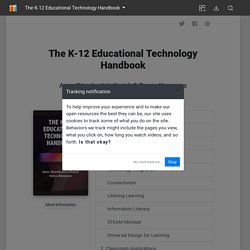
All chapters are written by professionals in the field, including university researchers, teacher educators, and classroom teachers. The book in its entirety and each chapter can be freely accessed, downloaded, printed, and remixed. Professors of educational technology courses can select the chapters that will work best for them when creating course packets, and preservice and inservice teachers can use relevant chapters for trainings and professional development purposes. Suggested Citation Ottenbreit-Leftwich, A. & Kimmons, R. (2018). Cover Design Royce Kimmons Vector art by Vecteezy.com Licensing CC BY: This book is released under a CC BY license, which means that you are free to do with it as you please as long as you properly attribute it.
EJ1222907. Triple E Printable Rubric for Lesson Evaluation - Triple E Framework.
PRISM: Casting New Light on Learning, Theory and Practice. Submission Preparation Checklist As part of the submission process, authors are required to check off their submission's compliance with all of the following items, and submissions may be returned to authors that do not adhere to these guidelines.
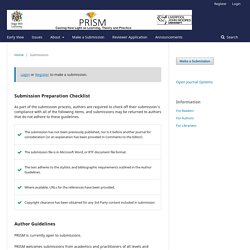
The submission has not been previously published, nor is it before another journal for consideration (or an explanation has been provided in Comments to the Editor). The submission file is in Microsoft Word, or RTF document file format. The text adheres to the stylistic and bibliographic requirements outlined in the Author Guidelines. Where available, URLs for the references have been provided. Author Guidelines PRISM is currently open to submissions. PRISM welcomes submissions from academics and practitioners of all levels and experience. Original Research Articles (5000-7000 words)Academic/Experimental/Policy Papers (1500-3000 words)Book Reviews (1000-1500 words)Blog Posts Privacy Statement. Cognitive Load Theory and its application in the classroom. Benefits from retrieval practice are greater for students with lower working memory capacity: Memory: Vol 25, No 6.






